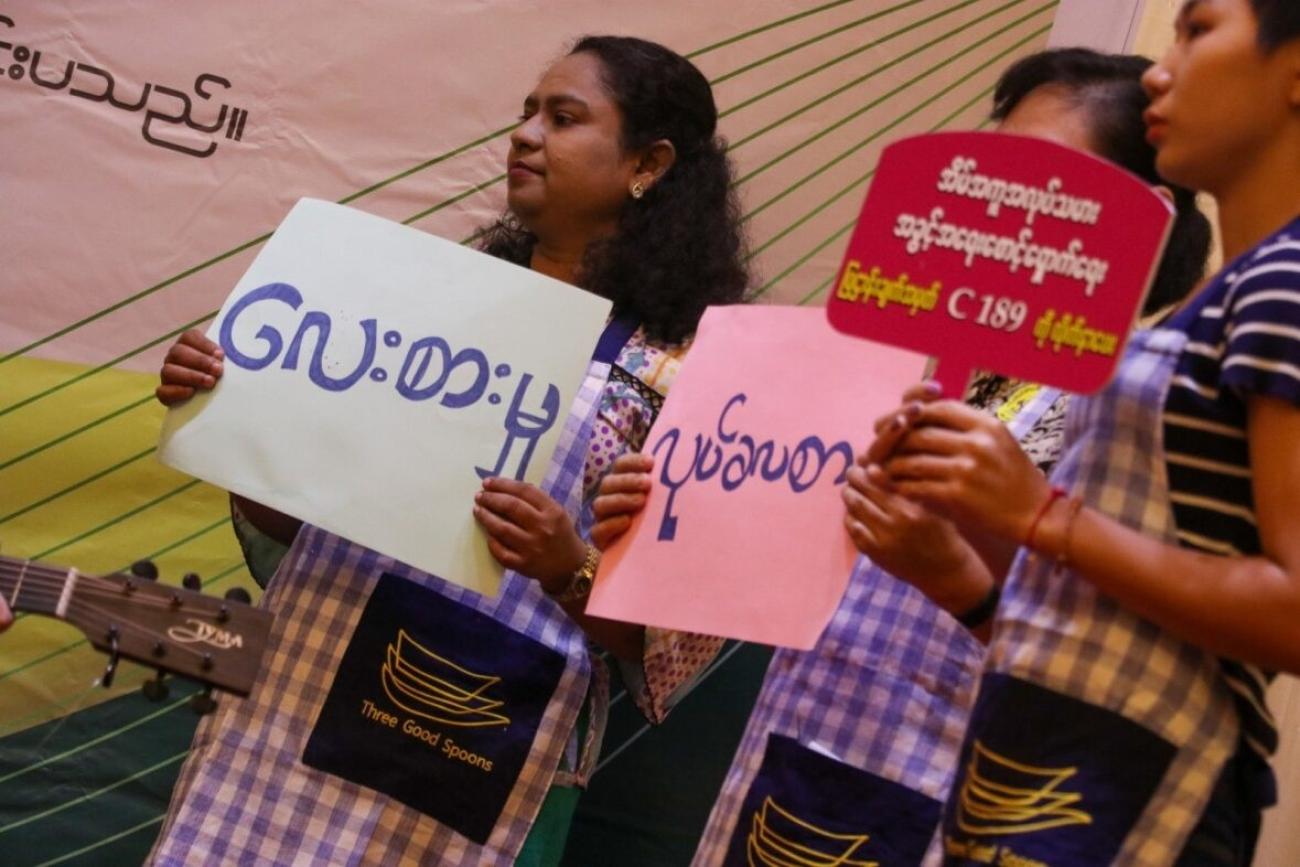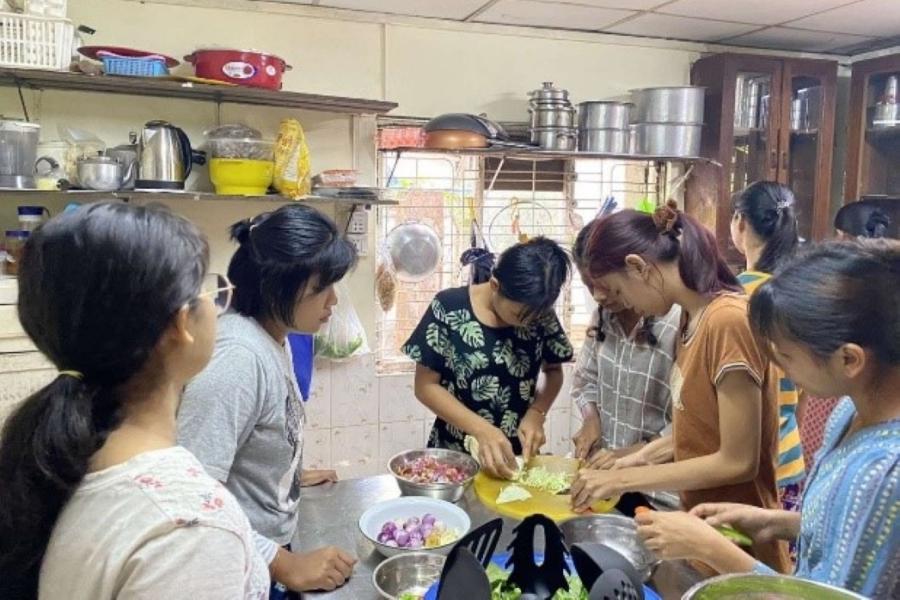"Empowering Domestic Workers: The Inaugural Journey of the First Myanmar Domestic Worker Association"

The Inaugural Journey of the First Myanmar Domestic Worker Association contributes to a world of work free of violence and harassment.
“I am a 33 year old woman from Yankin township. I have been employed as a domestic worker for local employers since I was young. In the job, I have to deal with isolation and, loneliness. I did not have confidence to talk with people. But the scenario changed after I joined The Three Good Spoons “Licence to Stir” training course. Not only did I learn so many practical things, but I also became so much more confident and resilient. I also found that I could help others who are struggling the way I used to. This sort of confidence encouraged me to become a founding member of the domestic workers association where we will advocate for the rights of domestic workers.” Yu Wah, License to Stir graduate, a domestic worker and a founding member of Myanmar Domestic Workers Association
Three Good Spoons (TGS), a non-profit social enterprise based in Yangon, Myanmar, has for many years run cooking classes for domestic workers, as well as an intensive 4-week course called “Licence to Stir”, which incorporates sessions on hygiene, nutrition, working conditions, as well as labour and social rights. The course also includes sessions on the ILO Convention concerning Decent Work for Domestic Workers, 2011 (No.189). The ILO TRIANGLE in ASEAN programme supported TGS to open a new vocational training centre, equipping domestic workers with skills and knowledge to secure decent work both within Myanmar and overseas. The ultimate goal is to enhance the competence and confidence of Myanmar women domestic workers, wherever they are, enabling them to maintain their resilience, address their rights, adapt to diverse economic and social settings. Past graduates of TGS courses have remained actively involved and have been instrumental in setting up a membership-based domestic workers association.
“I have been working as a domestic worker for several years. Initially, I was unaware that I had any labour rights. Most people don’t think domestic work is work like all other types of work! It was only when I joined the Three Good Spoons trainings that I became aware of the rights I do have, and those I should have. Through our association, we can collectively advocate for domestic work to be recognized as work that is entitled to protection and respect, and together we can have our voices heard. We are not only broadening our network to connect with as many domestic workers as possible within Myanmar, but also those who have migrated for work in other countries. By so doing, it has enabled us to have an all-inclusive picture of issues confronting our peers from near and far. As we share information together in our association, it helps us to address the challenges and difficulties with confidence.” Kay Zin Nwe, License to Stir graduate, a domestic worker and a founding member of Myanmar Domestic Workers Association
The newly born association is taking baby steps to empower the current members to take on responsibilities of recruiting new members, sharing knowledge, and strategizing on how best to advocate for domestic workers’ rights at home and overseas. From 15 founding members, the association has already actively expanded its membership through knowledge-sharing sessions and networking activities. Within a year, it has grown to 50 members and established a network of domestic workers in Thailand, Singapore, Cambodia and Indonesia. In October 2023, the association held its first association meeting, where the members developed the Terms of Reference of the association and the organizational structure, as well as elected their leaders. Despite occasional challenges, the members are committed to building a strong and active association which will support and empower domestic worker peers. With a broader base of members, the Association aims at representing more voices in advocating for their rights in more systematic and strategic fashion.
"I am currently employed in Singapore and prior in my current employment, I had an opportunity to participate in the Three Good Spoons “License to Stir” training in Myanmar. When I was interviewed for my job in Singapore, I presented my skills certificate from Three Good Spoons, which I believe played a key role in my selection. As a result, I secured a higher salary and received all my legal entitlements in Singapore. On my days off, I actively engage in additional Three Good Spoons training sessions and discussions to further enhance my knowledge and skills as a domestic worker.” - Naw Day Bright, domestic worker in Singapore

The Myanmar Domestic Worker Association has already run trainings and held discussions on laws and policies which protect or exclude domestic workers from labour rights and social security. The Association has trained participants on international standards, especially the Domestic Workers Convention, 2011 (No.189) as well as the Violence and Harassment Convention, 2019 (No.190). In the region, only the Philippines has ratified C189, and no countries in Asia have ratified C190. This might be an indication that it would likely take a long time with arduous struggle to get domestic workers’ rights recognized and their safety and rights at work protected. However, this group of pioneer domestic workers in Myanmar is not daunted. Ms Bridjit Thu, the chair of the Association said, “It is never easy to establish a labour organization, but it is harder to organize domestic workers. The lack of recognition of domestic work as work with entitlements to legal protections makes us more vulnerable. ILO Convention 189 provides decent work for domestic workers. We want our employers to respect the ILO Convention and provide our labour rights. Also, our skills should be recognized and there should be more skills trainings for young domestic workers particularly for those migrating to new environments.”
As well as providing technical support and trainings for Three Good Spoons, the ILO TRIANGLE in ASEAN programme also supports a network of centres for migrants located strategically in both the countries of origin and destination. These centres provide information, legal assistance, trainings, and psycho-social care for migrant workers in all sectors. In countries of destination, Myanmar domestic workers can reach out to any of these centres and in Thailand and Singapore two organizations HOMENET and HOME respectively have a particular focus on domestic workers. For domestic workers, being part of this larger support network breaks the isolation and relieves the stress. The Association and the larger network of organizations provide a safety net in times of trouble and provide opportunities to meet, relax and have fun with other migrants. The network of migrant organizations across countries can provide end-to-end assistance throughout the migration cycle.
“Freedom of association and the right to collective bargaining are fundamental rights that should apply to all workers – including migrant workers – without distinction. In reality, however, many workers are unable to establish and join trade unions and enjoy the benefits stemming from collective bargaining. Domestic workers and, in particular, migrant domestic workers are among those who have least access to these fundamental rights. At the same time, this group of workers are also among the most vulnerable to work-related violence and harassment. As we now enter the 16 Days of Activism against Gender-based Violence, we, at the ILO, are proud to see the progress of Myanmar’s first domestic worker association! We will continue to support the Association so that they can reach many more domestic workers and ultimately contribute to a world of work free of violence and harassment.” -- Anna Engblom, Chief Technical Advisor, TRIANGLE in ASEAN programme, ILO



